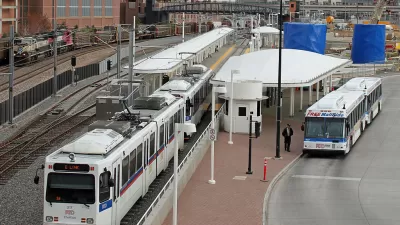The financial data is clear: BRT costs much less to go further and serve far more riders. Case closed, or is it? The Denver Post editors look at HNTB's cost and ridership estimates for the Northwest Rail Line and offer a recommendation, sort of.

The editorial board reviews the findings reported by Monte Whaley on the Northwest Rail Line, "a 41-mile high-capacity, fixed-guideway transit project from Denver Union Station to Longmont," according to Regional Transportation District (RTD) of Denver's webpage on the FasTracks project. Funding is available only for the first 6.2-mile segment from Union Station to south Westminster, currently under construction. After that, it gets interesting if alternatives are considered.
The next segment, 11 miles "from Westminster to Broomfield could cost as much as $681 million while about 100 miles of enhanced bus service [aka, BRT] in the northern suburbs would cost roughly half that and serve nearly eight times as many passengers, according to an analysis (PDF) for the Regional Transportation District", writes Whaley.
RTD agency hopes to bring a recommendation of the best transit option — commuter [light] rail, bus rapid transit [BRT] or a combination of both — to the governing board for a vote in early 2014.
It was these startling findings that prompted the editorial. Their fuzzy recommendation: "We can't have the Northwest Line at any cost". Without outright concluding that BRT is preferable over the expensive light rail extension that the people voted for in 2004 as part of the ambitious FasTracks projects, the editorial implies it. However, it points to reasons not to immediately abandon the train in favor of the bus.
- These are only preliminary findings; the study may yield other options.
- These are only estimates for capital costs, and under that analysis, rail is always more expensive at first. And other factors have still to be measured, such as accompanying economic development.
- We've said [last March] we want folks in the northern suburbs to get the rail they were promised if possible.
The editorial board suggests that if the northwest communities want to stick with the costly rail option that they were promised, more funding will be needed, such as a "statewide tax issue for transportation, preferably user fees like fuel taxes to pay for roads and transit." This clear funding recommendation for the type of funding option is in reference to a non-user fee proposal being considered to place a ".7%, 10-year general sales tax on the 2014 ballot."
FULL STORY: Sobering figures in RTD Northwest rail study

Planetizen Federal Action Tracker
A weekly monitor of how Trump’s orders and actions are impacting planners and planning in America.

Map: Where Senate Republicans Want to Sell Your Public Lands
For public land advocates, the Senate Republicans’ proposal to sell millions of acres of public land in the West is “the biggest fight of their careers.”

Restaurant Patios Were a Pandemic Win — Why Were They so Hard to Keep?
Social distancing requirements and changes in travel patterns prompted cities to pilot new uses for street and sidewalk space. Then it got complicated.

Platform Pilsner: Vancouver Transit Agency Releases... a Beer?
TransLink will receive a portion of every sale of the four-pack.

Toronto Weighs Cheaper Transit, Parking Hikes for Major Events
Special event rates would take effect during large festivals, sports games and concerts to ‘discourage driving, manage congestion and free up space for transit.”

Berlin to Consider Car-Free Zone Larger Than Manhattan
The area bound by the 22-mile Ringbahn would still allow 12 uses of a private automobile per year per person, and several other exemptions.
Urban Design for Planners 1: Software Tools
This six-course series explores essential urban design concepts using open source software and equips planners with the tools they need to participate fully in the urban design process.
Planning for Universal Design
Learn the tools for implementing Universal Design in planning regulations.
Heyer Gruel & Associates PA
JM Goldson LLC
Custer County Colorado
City of Camden Redevelopment Agency
City of Astoria
Transportation Research & Education Center (TREC) at Portland State University
Camden Redevelopment Agency
City of Claremont
Municipality of Princeton (NJ)



























